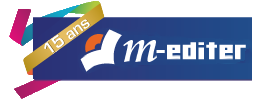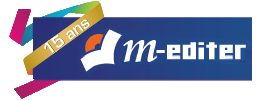Résumé
« Être chez soi en son autre » : par cette énigmatique formule, Hegel fixait le sens de la liberté qu’il léguait à la postérité. Mais, au-delà de l’étincelante condensation de cette définition, apparaissent de nombreux problèmes : de quels « soi » et de quel « autre » s’agit-il ? Pourquoi cette définition semble-t-elle liée à la notion de propriété et de quelle propriété s’agit-il ici ? Le présent ouvrage propose de répondre à ces questions fondamentales de la pensée hégélienne en prenant pour fil directeur le problème du sens : être libre, pour Hegel, c’est moins décider ou agir librement que prendre conscience du fait qu’il n’est rien dans le monde dont le sens ne soit lié à mon esprit. Être libre signifie donc retrouver dans le monde, l’autre, le sens que lui a attribué l’esprit, le soi.
Feuilleter quelques pages du livre :
Extrait dit par l'auteur :
 Vous aimez ? Rejoignez la chaîne YouTube des Édition M-Éditer. Faites un don en soutien et bénéficiez d'avantages réservés aux membres
Vous aimez ? Rejoignez la chaîne YouTube des Édition M-Éditer. Faites un don en soutien et bénéficiez d'avantages réservés aux membres
Autrement dit :
Sommaire
I. LA LIBERTÉ COMME ESSENCE FORMELLE DE L’ESPRIT
1. Y a-t-il de l’impensable ?
2. L’appropriation
3. Être chez soi en son autre
II. L’ACTIVITÉ DE L’ESPRIT
1. L’objectivation de l’esprit
2. Et la Nature ?
III. NÉCESSITÉ DE L’ALIÉNATION
1. Le rejet de l’utopie
2. Les libertés incomplètes
CONCLUSION : HABITER LE MONDE EN PROPRIÉTAIRE
................................
I. FREEDOM AS THE FORMAL ESSENCE OF THE SPIRIT
1. Is there anything unthinkable?
2. The appropriation
3. To be at home in your other person
II. THE ACTIVITY OF THE MIND
1. The objectification of the mind
2. What about Nature?
III. NEED FOR DISPOSAL
1. The rejection of utopia
2. Incomplete freedoms
CONCLUSION: LIVING IN THE WORLD AS AN OWNER
"To be at home in one's other": through this enigmatic formula, Hegel set the meaning of the freedom he bequeathed to posterity. But beyond the sparkling condensation of this definition, there are many problems: which "self" and which "other" are they? Why does this definition seem to be linked to the notion of ownership and what ownership is involved here? This book proposes to answer these fundamental questions of Hegelian thought by taking as its guiding principle the problem of meaning: being free, for Hegel, is less about deciding or acting freely than about becoming aware that there is nothing in the world whose meaning is not linked to my mind. To be free therefore means to find in the world, the other, the meaning attributed to it by the spirit, the self.
Caractéristiques
Éditeur : Editions M-Editer
Collection : Livre'L
Niveau : Débutant
Publication : 4 juin 2016
Édition : 1re édition
Intérieur : Noir & blanc
Support(s) : eBook [PDF], Livre papier
Contenu(s) : PDF
Protection(s) : Marquage social (PDF)
Poids (en grammes) : 66
Taille(s) : 355 ko (PDF)
Langue(s) : Français
Code(s) CLIL : 3000, 3006, 3018, 3023, 3024, 3026, 3080, 3126, 3129, 3130
EAN13 eBook [PDF] : 9782362871504
EAN13 Livre papier : 9782362871498
Du même thème
À partir de 2,50 € 2,38 € (-5%)
À partir de 2,50 € 2,38 € (-5%)
À partir de 3,50 € 3,33 € (-5%)
Ils ont également acheté
À partir de 2,05 € 1,95 € (-5%)
À partir de 5,00 €

















